#Article 31 Russian Constitution
Explore tagged Tumblr posts
Text
... Il y a des choses à ne jamais faire, ni de jour ni de nuit, ni par mer ni par terre par exemple, la guerre...

Le courage est aussi côté russe. Olga Misik, jeune militante anti-Poutine de 19 ans, opposante à la guerre en Ukraine, qui manifeste en lisant la constitution russe qui autorise les manifestations pacifistes. Sous le regard de la police qui hésite à intervenir. Image très forte
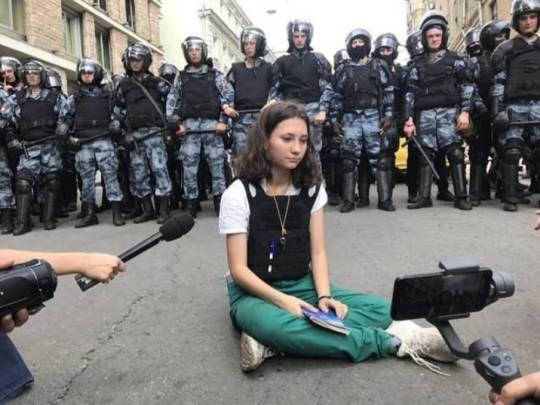
Courage is also on the Russian side. Olga Misik, a 19-year-old anti-Putin activist, opponent of the war in Ukraine, who demonstrates by reading the Russian constitution which allows peaceful demonstrations. Under the gaze of the police who hesitate to intervene
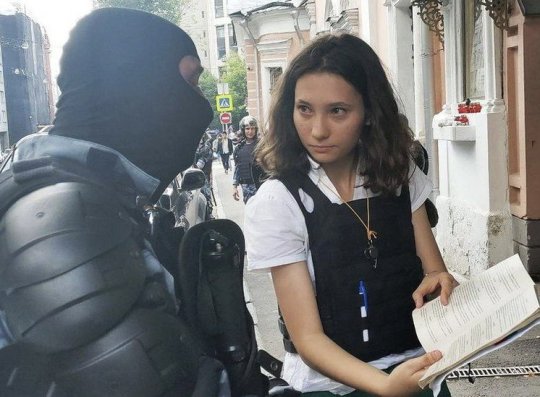
Was sentenced to 2 years and 2 months for attending a demonstration at the Rachmaninova Memorial There she sat in front of an OMON member and read him 31. article of the Russian Constitution, which declares citizens' right to non-violent assembly
19 notes
·
View notes
Text
Historically, Ukraine has been home to people of a variety of faiths and religious denominations, and it’s been exceptionally “open to receiving a wide spectrum of religious communities” in the years since the collapse of the U.S.S.R, according to expert Catherine Wanner.
This laissez-faire approach to religion stands in stark contrast to Russian state policy, which claims to embrace religious pluralism while systematically repressing religious liberty. In Russian-occupied areas of Ukraine, experts have documented at least 76 incidents of religious persecution since the full-scale war began in February 2022, including forced conversion, abduction, and murder.
This persecution, which some experts say may constitute a “systematic” campaign, has affected Ukrainians of a number of faiths, including Orthodox Christians, Catholics, and Muslims. But members of one group have been especially likely to face repressions: Protestants, despite making up between two and four percent of Ukraine’s population, were the victims of 34 percent of cases of religious persecution, as writer Peter Pomerantsev noted in his article “Russia’s War Against Evangelicals,” published in Time last month. This includes evangelical Baptists, who were the most likely denomination to face persecution after Ukrainian Orthodox believers.
Russia’s disproportionate targeting of evangelical Christians in Ukraine is no coincidence. One Ukrainian pastor quoted in Pomerantsev’s article summed up the occupation authorities’ mindset like this: “You are the American faith, the Americans are our enemies, [and] the enemies must be destroyed.”
To learn more about Russia’s violent campaign against Ukrainian evangelicals and one organization’s efforts to raise awareness about it in the United States, Meduza senior news editor Sam Breazeale spoke to Steven Moore and Anna Shvetsova from the humanitarian aid organization the Ukraine Freedom Project, and Catherine Wanner, a professor of history and religious studies at Penn State University who studies religious life in Ukraine.
Timestamps for this episode:
(2:30) Exploring Ukraine’s religious landscape since 1991
(9:31) The persecution of Protestants in occupied Ukraine
(26:14) The Role of the Russian Orthodox Church in the conflict
(27:24) Navigating political disinformation and support for Ukraine in the U.S.
1 note
·
View note
Text
a letter from russia
received this letter along the way and sent a bundle of hemp resources to the sender but lost track
not sure the date or where to archive this but seems important for the record
##
My name is Eugene Kazachenko. I'm from Moscow, Russia. Today, some > hours ago my friends from Marijuana march were arrested. They tried > to stretch the banner with calling to legalize marijuana. The goal > of this march was legalization marijuana for medical use. Now there > are about 20 people arrested. The police was very cruel with > marijuana activists. > > With fear for life of our brothers and sisters my friends and I are > receiving periodical news of Radio station "Ekcho Moskvy" - (The > Echo of Moscow": http://www.echo.msk.ru/ ). This is the only free > radio channel, which real informs of social and political life in > Russia. It informs that Police has placed people by faces on the > ground. Police has dragged girls upon the ground and has beaten > young men. Policemen have banged young men by their faces about > parked cars. In the police department some young activist was > beaten so cruel that this has caused coming an ambulance. > > The representatives of The Federal service of drug control have > accused all delaying activists in biased attitude to narcotics. > Without any reason they have accused participants of Marijuana > March in propaganda of narcotics. At the police department some > policemen are trying to plant the drugs to activists. However > attorney was not passed to his clients for legal defense. On > entrance with the sub-machine-gun in hands the policeman did not > let to attorney to come into the door of the police department. > > Marijuana March was organized by Cannabis Legalization League > (Please, visit http://www.legaliz.info/ ). At this moment all of > delaying marijuana activists are in Presnentsky administrative > (misdemeanor) court of Moscow (phone number of this court: +7 495 > 254-53-59). They are accusing for undertaking unsanctioned > meetings. This position of government disagrees with 31 articles of > The Constitutions of Russian Federation and Public International law. > > Though many religious confessions concern with a rehabilitation and > spiritual counseling for drug abusers, however they never call any > attention in regard to the realistic position of medical cannabis. > Regrettably Christians and other religious circles of Russia do not > raise a voice in rights protection of drugs consumers from > unjustified state repression. > > Because of unchangeable and increased repressive policy of Russia > in attitude to consumers of drugs the religious figures are > positioning itself apart of to questions of government drugs > policy. Hypocritically the majority of them tacitly agrees with > official drug policy or on the pattern of flattering politicians > they loudly convicts all people, which voice opinion for > legalization hemp as a medicine. > > With respect, > > Eugene Kazachenko > (MDiv of Moscow Theological Seminary).
0 notes
Text
Binance Urges Russian Users to Convert Rubles to Other Assets
Binance, the world's largest cryptocurrency exchange, has called on Russian users to convert their rubles to other assets by January 31. The cessation of ruble transaction support is part of Binance's decision to exit Russia and sell its local business, CommEX exchange. Binance will cease all services in Russian rubles, including cryptocurrency trading on the exchange, Binance Convert, and Binance Pay. Users are advised to exchange their remaining ruble assets for other available assets on Binance, convert rubles to cryptocurrency, or withdraw them through the exchange's partners before the termination of these services in rubles. Starting from February 1, 2024, at 11:00 MSK, any remaining ruble balances on users' accounts will be automatically converted to FDUSD stablecoins at the current exchange rate, according to the exchange's announcement. On January 30, 2024, at 11:00 MSK, Binance will delist all existing spot trading pairs with the ruble (BTC/RUB, USDT/RUB, and others). All open orders for these trading pairs will be automatically closed. Earlier, Binance announced the discontinuation of ruble transactions on its internal P2P platform and subsequently revealed the complete closure of the platform for Russian users. Disclaimer: The information provided is for informational purposes only and does not constitute financial advice. Users should conduct their own research and seek professional advice before making investment decisions. Read the full article
#AssetConversion#Binance#CommEX#cryptocurrencyexchange#CryptocurrencyTrading#delisting#FDUSDStablecoins#FinancialServices#P2PPlatform#Russia#RussianRuble#TradingPairs
0 notes
Text
When the Night Lanterns Sway
When the Night Lanterns Sway
“When the Night Lanterns Sway”: It’s Useless to Try and Beat the State on Its Own “Legal Turf” Alexander Skobov Kasparov.ru February 13, 2021 On February 9, Leonid Volkov, head of Navalny’s network of local teams, announced a flash mob for February 14, Valentine’s Day: residents of large cities should go into their courtyards at 8 p.m. and turn on their mobile phone flashlights. This is an…
youtube
View On WordPress
#"When the Night Lanterns Sway" (song)#Alexander Skobov#Alexei Navalny#Article 31 Russian Constitution#Belarusian protests#crackdown on protesters#flashlight protests#freedom of assembly#freedom of speech#Gleb Gorbovsky#Leonid Volkov#Russian Constitution#Russian police state#Youtube
0 notes
Text
Russian troops form a mob to arrest teenager Olga Misik while she reads Article 31 of the Russian constitution that guarantees the right to a peaceful protest. - https://i.redd.it/5aflavuelqn81.png
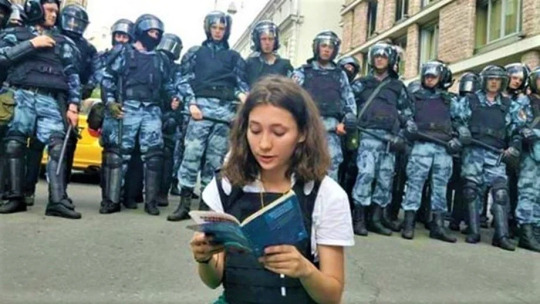
I dont know if there are enough soldiers. They should request reinforcements.
6 notes
·
View notes
Text
the sun is still shining
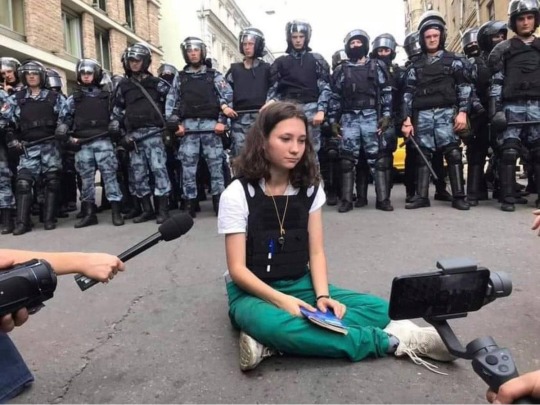
19-year-old Russia Olga Misik was sentenced to 2 years and 2 months last week, for attending a demonstration at the Rachmaninova Memorial in Moscow. At the demonstration, she sat in front of an OMON member (on the figure) ) and read him 31. article of the Russian Constitution, which declares citizen s' right to non-violent assembly.
Olga Misik delivered a breathtaking speech before the court. Here are some thoughts from her worth reading and remember: ′′ People often ask: Are you afraid? Those who don't live in Russia are asking this most because they don't quite understand the reality of Russia. They don't know banging on doors in the middle of the night, arresting and imprisonment without reason. They don't realize the feeling of despair we sucked with mother's milk. And this feeling of despair has taught us to live in hopelessness, but at the same time it weakens fear. Fear loses sense if you have no influence on your future.
I've never been afraid. I felt despair, hopelessness, helplessness, disorientation, anxiety, frustration, burnout, but never fear. I wasn't afraid when the armed men invaded our apartment and threatened to jail. They wanted to scare me but I wasn't afraid. I laughed and joked knowing that the moment I stop laughing I would be lost."
′′ When they drove me in a black van, I thought that this sunrise would be the last one I'd see. I was thinking about my father who I first saw crying in my life. To my mom who whispered in my ear: don't confess anything. I was sad and full of pain but I had no fear.
However, during the last nine months (in prison) I was afraid continually. I haven't really slept once since the first night. Every night I woke up to different sounds and imagined steps in the hallway. I was photographed by panic at the sound of cars passing under the window... Someone said it was impossible to be afraid when you know they were right. But Russia teaches us to be afraid. It's a country that tries to kill you every day, and if you're not part of the system, you might be dead already.
Of course I took part in the protest. I don't regret it and I'm proud of my actions. I didn't really have a choice though. I had to do what was in my power, so there's no point in regretting anything. And if I got that opportunity again, I'd do it again. Even if I was threatened with execution, I would do it again. I would do it again and again until some change started. They say doing the same things all the time and expecting a different result is the definition of madness. Perhaps hope is a manifestation of madness. But not doing what you believe in, just because someone around you thinks it's not meaningful, is only learned hopelessness. And it's better to be crazy in the eyes of the world than to be a creature without hope in your own eyes.... But you who jail me and reject all arguments of defense and accept all false evidence of plaintiffs, you know very well what crime you commit. But you can't ban youth. You can't ban freedom. You cannot suppress the truth.
This trial will affect your lives far more than mine. I chose where I stand. It's now up to you to choose the path you will go in life. If you condemn me, you will condemn yourself..."
′′ A fascist government never seems to be fascist from the inside. It only looks like occasional and illogical censorship and some repressions that don't affect you. But I'm not the only one in this process. Today you don't decide my fate, you decide your own. You can't lie to yourself forever. You know what's going on. You know where good is and where evil, freedom and fascism, love and hate are, and if you decide not to join the right side, it will be a colossal lie from you. Those who chose evil have prepaid tickets to The Hague.
I don't promise to win tomorrow, the day after tomorrow, in a year or in a decade. But one day we will prevail, because love and youth will always prevail. I can't promise I will live to see it, but I hope you live to see it."
′′ The past nine months have been difficult and I asked myself if something could have happened differently. But I was just telling myself because nothing could be different. From the moment I took the institution into my hands, my fate was carved in stone and I accept it with pride. I made the right decision and for such a totalitarian state will always be paid with a high price. I always knew I'd end up in jail one day. I knew what I did wasn't stupidity or misfortune or coincidence and not a crime. I always knew this would happen and I was always ready. I'm not surprised by anything."
′′ The Nazist regime fell one day, just as the fascist regime in Russia falls. I don't know when but one day it will happen. The last words of Sophia Scholl (German student and anti-Nazist warrior executed by Nazist in 1943) before the execution were: ′′ The sun is still shining." Really, the sun is still shining. I can't see him from behind the walls of prison, but I always know he's there. And if now, in these dark times, we can turn to the light, maybe there is no victory that far."
(According to Diary N, Martin M. Šimečka, 16.5.2021)
11 notes
·
View notes
Text
supreme dysfunction
A lot of the politics around the Supreme Court has a kind of soft-focus, sepia-toned Before Times deceptiveness about it. The obfuscation is as thick and persistent as it is because the situation is extremely simple. Several decades ago, Republicans realized they could not win fair and square, so they put a lot of institutional focus and an obscene amount of money into rigging the courts. Cheating is the secret sauce. I realize that’s not a satisfying explanation for years of political dysfunction, but it is what it is.
And yet here we are, six weeks from Election Day, facing the prospect of a Trump-brand replacement for the irreplaceable Ruth Bader Ginsburg.
What you need to do is keep your head for the next few weeks. If that means putting this out of your mind as soon as possible, fine. All you need to know is that anyone this criminal would nominate to the court will be a disaster and anyone who would accept a nomination under these circumstances is wildly unfit to judge a dog and pony show. Republicans really did tell loud and insulting lies all throughout 2016 about why they wouldn’t confirm the replacement for a Supreme Court justice who passed away nearly a year before an election, and they really are out here now mocking the idea that anyone might have had to pretend to believe them then. They will probably succeed in pushing through a sentient garbage fire before the election, but we have to try to make it hurt. All you need to do is call your senators and tell them to honor Justice Ginsburg’s wish by refusing to confirm anyone Trump nominates. Either you’ll hear that they’re trying to do the right thing, which might make you feel better, or you’ll get an opportunity to call a Republican a fascist pig, which always makes me feel better.
If you are going to be following this farce, out of interest or because you can’t block it out, let me help you prepare for some of the bullshit that’s coming at you.
One of the foundational assumptions commentators make is that Democrats don’t “care” about the courts in the way Republicans do. Whenever you hit that assumption, think of this article:
Hillary Clinton Just Delivered the Strongest Speech of Her Campaign—and the Media Barely Noticed
Madison, Wisconsin—Hillary Clinton delivered the strongest speech of her 2016 campaign in Wisconsin this week, and the media barely noticed.
At the time (March 31, 2016) this article was just one of the many passive-aggressive subtweets from responsible commentators that their colleagues were ignoring policy for spectacle. After 2016, when Clinton’s supposed failure to go to Wisconsin has been waved like a talisman against any retrospective concern about whether the presidential election was even free (questionable) and fair (definitely not), it’s the fact that the press ignored a campaign event in Wisconsin which gives it that twist of dramatic irony. But it is also relevant because Clinton’s speech was about why anyone who truly cares about a progressive agenda must prioritize the federal courts as an issue. Since then, the press – who were called out AT THE TIME for ignoring substance generally and this speech specifically – have settled on “Republicans have seized the federal courts because Democrats don’t talk about the courts” as their new just-so rationalization for Moscow Mitch’s latest crime against democracy.
It’s bad enough that influential commentators ignore the substance of Democratic campaigns in favor of airing Trump’s empty podium and then use their own failures as an excuse to lie about whether or not Democratic politicians talk about the courts or any other issue. But the reality is even worse: in 2016 the Democratic candidate gave a brutally prescient speech about the courts, and our blue-check betters collectively decided to lie about WHETHER SHE WAS EVEN PRESENT AT HER OWN SPEECH. Then they used that lie to derail any chance of accountability for the MULTIPLE CRIMINAL CONSPIRACIES her opponent’s campaign committed, or even the slightest hint that they probably shouldn’t have allowed an autocratic regime that regularly murders actual journalists to be their assignment editor at the most important moment of their careers. “I wouldn’t have spent four months helping Russian intelligence dox Clinton campaign employees if only they’d gone to Wisconsin!” is a thing you can say without losing an ounce of standing in the pundit-industrial complex; of course lying about Democratic campaign messaging on the justice system carries even less of a penalty.
I’m ranting a little because RBG deserved to live three hundred years and these gaslighting bootlickers deserved to be flayed alive, boiled in oil, and fed to rabid vampire squirrels. But I also think people should absorb my point about just how rotten the information environment is. There is every political incentive for Democrats not to bother talking about they courts. They do it anyway because they know it’s important.
That terrible information environment has the predictable consequence of misinforming people. Even if you are trying to encourage people to act on this issue because you sincerely care about it, you end up saying ridiculous things sometimes.
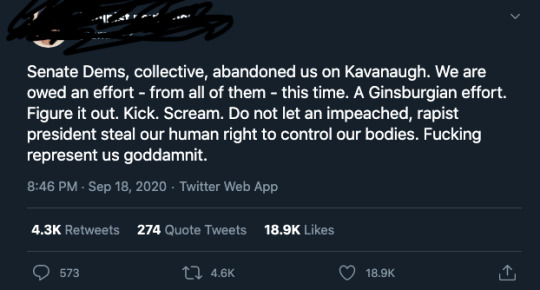
Senate Democrats could have stopped Brett Kavanaugh’s confirmation by sacrificing a virgin basilisk under a harvest moon to summon the wrath of the Old Ones, but they didn’t even try!
This is, to put it kindly, rewriting history. Senate Democrats made a herculean effort against Kavanaugh. Even before Christine Blasey Ford’s and Deborah Ramirez’s stories came out, Democrats on the Senate Judiciary Committee made the best case possible for the Senate to reject his confirmation.* After Dr. Ford was outed against her wishes, Democrats used every tool they had to force as much of an investigation as they could get, which drew maximum blood from Republicans, who were always going to do the wrong thing no matter what. Because Democrats did the work, voters got the point in the 2018 midterms. The Kavanaugh spectacle kept Republicans from gaining too much ground in the Senate in a year they should have cleaned up, and it radicalized the educated suburban voters who gave Democrats an unprecedented victory in the House.
None of this worked because Senate Democrats are in the minority, but they did try everything they could possibly have done. It’s true that they did not invent time travel and go back to re-run the 2014 midterms or rewrite the laws of mathematics to make 48 more than 52, because those things are impossible.
When people do the thing you supposedly want them to do, and you respond by stubbornly insisting they never did it, you’re not motivating them to do a better job. You’re telling them they should ignore you because you don’t actually care what they do.
I’m using this tweet as an example of a problem I see a lot, but my point isn’t to dunk too hard on this rando. We’re all a little emotional right now and who amongst us has never responded to stress by being Wrong Online; more importantly, it’s not entirely this person’s fault that they’re misinformed. You’re not supposed to have to be a huge nerd that actually watches Senate committee hearings! You’re supposed to be able to rely on the news to give you a reliable idea of what’s happening!! That’s literally their job!!!

AAAArgh. Okay. I’m back.
So. Okay. There are pervasive failings in news coverage of the politics around the federal courts, which leads to a lot of silly misunderstandings in the public more generally. Even if you work your way through all that nonsense and get to a reasonable understanding, you will find a fairly persistent asymmetry. The Republican establishment really does put a wildly disproportionate amount of effort into building conservative movement infrastructure for right wing lawyers and judges, and until recently, Republican voters really were much more likely than Democratic voters to tell pollsters that they were highly motivated by judicial nominations. Taking these things on face value and saying “oh, well, Republicans care more about the courts” obscures some really important, though disturbing, underlying dynamics.
The professional and intellectual ecosystem behind the conservative legal establishment is one of those situations where you really have to apply the Trunchbull principle. There really are millions and millions of dollars pumped into think tanks which invent bizarre excuses for radical right-wing subversion of the public interest by judicial fiat, extravagant “retreats” where sitting judges are alternatively pampered and bombarded with the resulting propaganda, and clubs which indoctrinate young conservative law students and vet them for career advancement based on their fealty to right-wing dogma. Describing what the Republican establishment is doing sounds fevered, conspiratorial hyperbole. I wish it were! If you don’t want to take my word for it – and I really wouldn’t blame you – you can get a lot of gory details from Vox.com’s courts and justice editor Ian Millhiser and Senator Sheldon Whitehouse (D-RI).
Senator Whitehouse’s main thesis is that these radical right-wing interests understand that a hostile takeover of the federal judiciary is in their financial interests, and that’s definitely sufficient to explain it. My personal sense is that there’s a second, even more unsettling, dimension to this. Article III of the Constitution deliberately insulates the federal judiciary from political pressure as much as possible. Another way of saying that, of course, is that the federal judiciary is removed from democratic accountability. I don’t think it’s just that the economic policies they want are unpopular. I think the investment in this judicial takeover project is motivated in part by the American right wing’s dark authoritarian streak. They value the judiciary because it’s the most leverage they can get against the electorate. “Judges!” is anti-democratic and that’s why they like it. It’s not just that they want things the voters don’t want so they have to get creative; it’s that they resent the voters for even having the ability to get in their way.
It’s not just the dedication to getting judges they agree with on the courts. It’s also the degree to which they expect those judges to humiliate themselves. They’ve had ten years and roughly the GDP of a small country at their disposal to come up with a challenge to the Affordable Care Act which did not sound like unhinged gibberish. Instead, they came up with the legal equivalent of a drunk guy trying to write a sonnet in Dothraki with a yellow crayon. (Actually that might be an improvement, so NOBODY TELL THEM ABOUT DRUNK DOTHRAKI CRAYON SONNET GUY.) It’s such a stinker that you hav to wonder if it isn’t the same phenomenon as what drives Trump and other autocrats to tell such blatant and ridiculous lies: it’s a power trip that shows off how they don’t even have to care about what “is true” or “makes sense,” because fuck you, that’s why. So what if an overwhelming majority of the American people have successfully convinced their elected representatives that health care costs were too much of a driver of economic inequality and limits on that are a good thing? We can still wreck it, because [*long fart noise*].
And if you listen to what Republicans say about the Supreme Court with that in mind, it starts to make a lot more sense. Under cover of mainstream apathy or even approval, the court gives conservatives unearned victory after unearned victory. If you’re a conservative, you’ll want to avoid killing that golden goose by making the court’s bias toward you completely undeniable. But if you’re a fascist, your priority is getting the court to commit. Any concession to truth or democracy, even if it’s just lip service, seems like a crack in the wall that your enemies can exploit, because it is.** As funny as it is to watch their little Pravda knockoff cry about John Roberts, Leftist Judas, this is what they mean: sometimes he tries to preserve the fiction that he hasn’t turned the Supreme Court into an arm of the radical right, which means they don’t win 100% of what they want immediately. Even Neil Gorsuch – hack, sadist, full-time Mayor Wilkins impersonator – can actually be cajoled into doing the right thing occasionally by lawyers who can craft an argument that fits into his crimped, cherry-picked definition of logic.
Like I said. Dark. I don’t want to overwhelm and discourage you. I think their absolutism and desperation is because even they know the victories they’ve won can slip away fast. But deluding ourselves hasn’t been constructive.
For their part, rank-and-file Republicans say they care about the courts. Fine. Republicans say a lot of things. They don’t think saying true things is important; if they did, they wouldn’t be Trump voters. Years before Trump, Republican voters learned how to give reporters and pollsters certain buzzwords to make their worst views sound more palatable. People are starting to grasp this with the “pro-life” white evangelicals who say they care about abortion on religious grounds. They support Trump as strongly as ever, despite the babies in cages, forced hysterectomies, and hundreds of thousands of COVID-19 deaths proving that neither he nor his party are in any way “pro-life.” It’s because “abortion” is the way they can get away with saying they support white patriarchy. Trump isn’t their guy despite his sleaziness, it’s because “grab ‘em by the pussy” has always been their actual preferred policy. “Law and order” is their dogwhistle for anti-Black racism. “Immigration” is the world they use when they mean they want more racism generally; pre-Obama, the preferred code phrase was “national security” but we’ve all seen how much of a shit they give about that.
As code words go, “judges” is less direct. Some commentators who try to parse it say it’s really about Roe v. Wade, but as we just went over, they don’t actually give a shit about that either. For some of them, “judges” is a sufficiently abstract rationalization for supporting Republicans when they know it is morally indefensible. This was probably a more pronounced issue than usual in 2016, both because it was so much harder to defend a vote for Trump and because of his inconvenient habit of giving the game away on the usual shibboleths. For others, “judges” represents the same thing it does for Republican elites.
I don’t know how conscious any of this is. I’m sure plenty of them have convinced themselves of whatever rationalization they give. Because we’re pretty good at fooling ourselves, what people say in opinion polls doesn’t necessarily tell us more than what they do when they’re not being prompted by pollsters. When Justice Scalia died four years ago, you didn’t thousands of people coming out to grieve for days on end. Little kids don’t dress up on Halloween as Chief Justice Roberts. RBG didn’t inspire that devotion by being a warm and gracious soul, although by all accounts she was. Liberals and progressives developed our sincere admiration of her because of her work on the bench. That is to say, Democratic voters care a great deal about the court. We just have to get our act together and do something about it.
The bad news is that winning in November is going to be the easy part. The good news is, we are getting organized behind some reforms that have been needed for many years. It’s not just Extremely Online progressives who are pushing for this. Even cool-headed institutionalist Democrats are openly advocating radical action. Democratic leadership are unlikely to get too specific right now – and they probably shouldn’t – but if voters do our job in November, some big and important changes are on the table.
*Footnoted because it isn’t really relevant, but Senate Democrats flawlessly executed a precise and coordinated strategy against Kavanaugh. The first few members to question Kavanaugh each focused on a specific issue tailor-made to give one or two of their Republican colleagues a reason to do the right thing. Then, boom, sucker-punch, Cory Booker started releasing the embarrassing emails Republicans were abusing committee rules to hide. Then, bam, left hook, Kamala Harris tripped him up by making him try to deny having been asked for assurances on the Mueller investigation. They did a great job, which everyone forgot about when someone threw Dr. Ford to the wolves.
**This is also a big part of why conservatives feel so instinctively victimized by the existence of a “liberal media” no matter how hard the political press bends over backwards to pound both thumbs on the scale for them. A free press actually is necessary for the functioning of the whole post-Enlightenment idea that people should have some say in how they are governed. If you’re an authoritarian who genuinely does feel that might makes right, then a somewhat functioning news media does at least pose a hypothetical threat to your power and even your worldview.
15 notes
·
View notes
Text
Teenaged girl becomes a resistance symbol for her peaceful reading of the Russian constitution to a Putin goon-squad (they beat her up later)

Article 31 of the Russian constitution guarantees the right to peaceful political assembly, which is why Russian opposition protesters like to wave copies of the constitution around as Putin's goon-squads descend on them to dole out savage beatings and mass arrests.
On Saturday, a 17 year old woman from Moscow named Olga Misik sat down in front of a line of armed, locked and loaded riot cops and quietly read the constitution to them, setting up a photo-op of the genre that includes Tiananmen Square’s Tank Man, Taking a Stand in Baton Rouge, and the photos of a pigtailed, defiant Greta Thunberg standing alone in the cold before the Swedish legislature.
Misik was part of a protest over the banning of leading opposition politicians from upcoming municipal elections in Moscow. She says that after the protest, she was beset by riot cops who beat her up and then arrested her. She faces charges for "attending a public event which was held without filing a notice."
Misik is an articulate spokeswoman for protest, grounding her action in a wider context: "Injustice always concerns everyone. Today the Moscow City Duma, tomorrow the governor of the region, a week later the head of the Resurrection District. It is only a matter of time. It is foolish to think that this is a rally only for free elections or the admission of candidates. This is a rally in defence of elementary constitutional rights that would not be questioned in a democratic state."
The pictures and videos of Misik reading to the riot squad have become a rallying point for the opposition.
Misik's father is a Putin supporter.
https://boingboing.net/2019/08/01/article-31.html
96 notes
·
View notes
Link
The coronavirus pandemic has given the perfect opportunity for autocratic governments to inhibit freedom of assembly. What could be a better excuse for smothering this expression of free speech? We can’t have you spreading the virus, so you cannot speak out against the government .
In one day, May 28th, 8 protesters were arrested in Russia. These weren’t protesters in a mass protest, which are understandably restricted. They were protesting alone with masks on. Clearly this doesn’t constitute a “mass gathering” of the kind not allowed by Russian coronavirus policy. Nonetheless, the government is conveniently stopping ALL protests from taking place.
Article 20 of the Universal Declaration of Human Rights, which Russia signed onto, protects the “freedom of peaceful assembly.” In fact, Article 31 of the Russian constitution guarantees the same right for Russian citizens.
This brings up the timely issue of protesting during a pandemic. To what extent should protests be controlled? Injustice shouldn’t take a break and neither should activism. I think protestors should wear a mask and attempt to social distance. But if protestors are picketing peacefully and especially if they are doing so in accordance with pandemic guidelines, as they were doing in Russia, further action by authorities needs to be scrutinized.
2 notes
·
View notes
Text
Our Vilnius
Ineffable travels are going on!
These time Crowley and Aziraphale decided to go to Vilnius. It is a very strange city. An European capital which is filled with very strange magic and uniqueness.
The city was build where small river Vilnia is flowing into the bigger river Neris (or Vilia)/ In this place the lithunian king Gedimin slept once and saw an iron wolf in his dream. He came to his priest for explanations, and the priest told to rise the city in this place. Here is a monument for him.
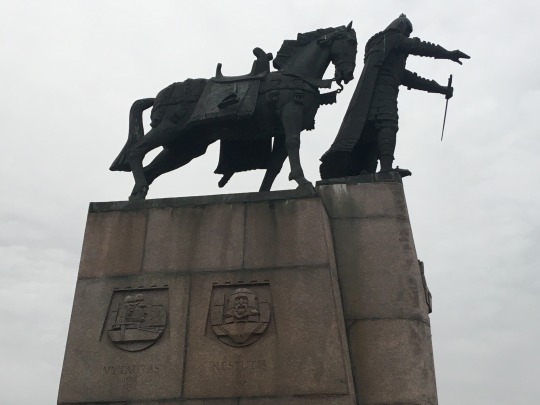
Crowley and Aziraphale went to the rivers and find them beautiful.
Here they are on the wall of Gedimin tower - it’s all that remained after that lithunian king. And the river behind them is Neris. This river is not tamed yet, and the city might get flooded by her waters.

Vilnia is very different.

Could you imagine how to get to this swing?

It was dark under the bridge, but their wanted take a picture nevertheless.
Behind that river is Užupis Republic.
When we found its constitution we were very impressed. I think that very kind and brave and wonderful persons have created this.
I have found this histiry about them:
“Užupis Constitution was written one summer evening of 1998 by the Uzhupis citizens Romas Lileikis (later – President of Uzhupis) and Tomas Čepaitis (later – Minister of Foreign Affairs and sometimes the King:) It’s hard to say now who of them wrote which right, the only truth known to history is that President loves dogs, and Foreign minister loves cats, so articles about the rights of these citizens can be authorized.
Užupis Constitution, sometimes called the Constitution of the Old Towns (Medinas) became popular. It was proposed to make it in metal and hang on the wall. The first plaque was attached to the wall of the bar in the Užupio kavinė, where all the Revolution of Angels began. For others the long wall on the right side of the Paupio Lane was chosen. First plaques were Lithuanian and English, than – French, than (in 2002) translations into the Vilnius languages – Russian, Polish, Byelorussian (Georgian board also fall in the middle:)) and Yiddish, and from the 2009 plagues are unveiled yearly. Usually the producing of the plague is sponsored by the Embassy of the country of the language in Lithuania, sometimes wholly sponsored by the Embassy of Uzhupis in this country.”
The Užupis Constitution terms:
1. Everyone has the right to live by the River Vilnele, and the River Vilnele has the right to flow by everyone. 2. Everyone has the right to hot water, heating in winter and a tiled roof. 3. Everyone has the right to die, but this is not an obligation. 4. Everyone has the right to make mistakes. 5. Everyone has the right to be unique. 6. Everyone has the right to love. 7. Everyone has the right not to be loved, but not necessarily. 8. Everyone has the right to be undistinguished and unknown. 9. Everyone has the right to idle. 10. Everyone has the right to love and take care of the cat. 11. Everyone has the right to look after the dog until one of them dies. 12. A dog has the right to be a dog. 13. A cat is not obliged to love its owner, but must help in time of nee. 14. Sometimes everyone has the right to be unaware of their duties. 15. Everyone has the right to be in doubt, but this is not an obligation. 16. Everyone has the right to be happy. 17. Everyone has the right to be unhappy. 18. Everyone has the right to be silent. 19. Everyone has the right to have faith. 20. No one has the right to violence. 21. Everyone has the right to appreciate their unimportance. 22. No one has the right to have a design on eternity. 23. Everyone has the right to understand. 24. Everyone has the right to understand nothing. 25. Everyone has the right to be of any nationality. 26. Everyone has the right to celebrate or not celebrate their birthday. 27. Everyone shall remember their name. 28. Everyone may share what they possess. 29. No one can share what they do not possess. 30. Everyone has the right to have brothers, sisters and parents. 31. Everyone may be independent. 32. Everyone is responsible for their freedom. 33. Everyone has the right to cry. 34. Everyone has the right to be misunderstood. 35. No one has the right to make another person guilty. 36. Everyone has the right to be individual. 37. Everyone has the right to have no rights. 38. Everyone has the right to not to be afraid.
And they have three commandments: 39. Do not defeat. 40. Do not fight back. 41. Do not surrender.
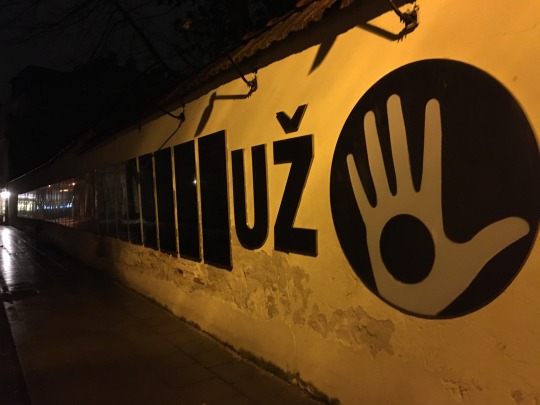
This is the wall on Paupio lane where Constitution plaques are placed.

We were here in the night only.
The symbol of this republic is an opened palm with a hole through it. It is for their openness and they couldn’t ever be corrupted!
We found some more magic things there.
A very ancient oak in the Cathedral square.
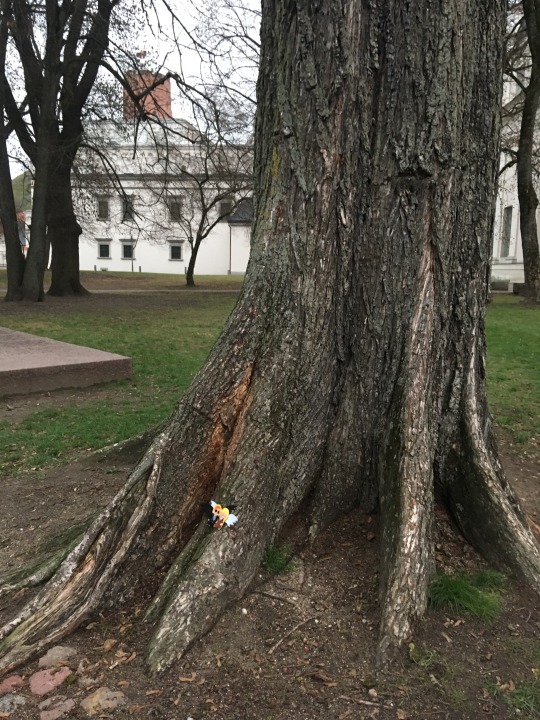

An invisible cafe from the book “The tales of old Vilnius” in Boksto lane, number 10. No one can understand why there is no cafe in this beautiful place, and the reason is the existence of the invisible cafe. You could go there only when you are dreaming. Book fans are writing on the door about the owners of the cafe and some great and positive thoughts.

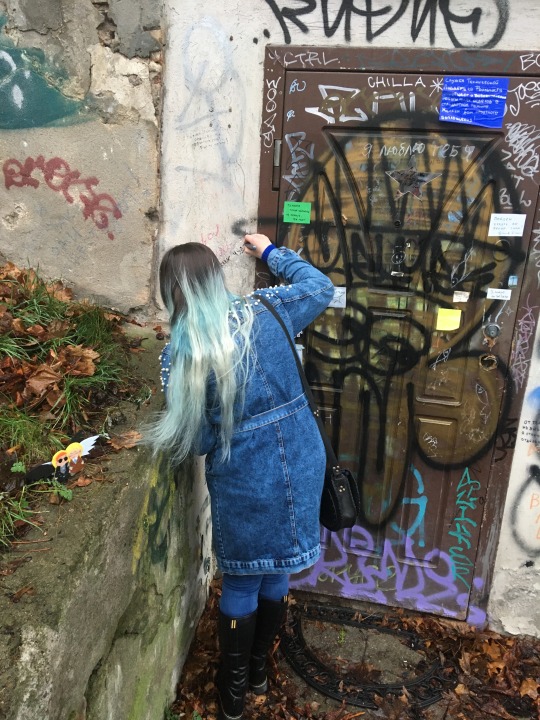
And we found a tile with the writing “stebuklas” that means “miracle” on the Cathedral square.

A reminding of the days of Pride.

A sculpture of chronicler and box-tree of enormous size (for that kind of trees and north country). And Vilnius’s courtyards are just perfect!

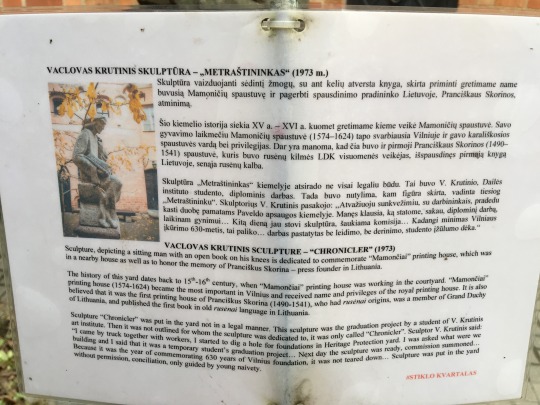


And when you are walking through this magic ancient city you find little miracles everywhere.

Mosaics on the sidewalks.

Mirrors on the walls...

Sign with ducks. (The words means Užupis is here)...

The tram’s stop where is not any tram in Vilnius...
And we find two of our favorite books, and read from them on one of the Vilnele bridges. And brought them home.

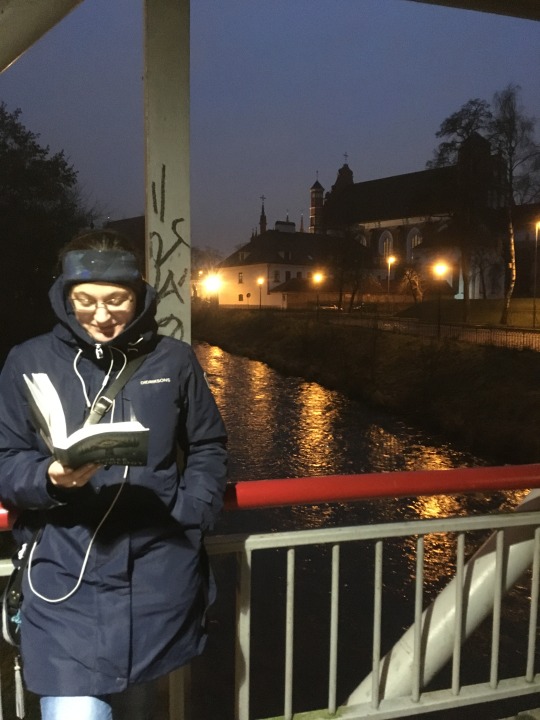
Ye Saga Continued...
#good omens#neil gaiman#Aziraphale#crowley#the ineffable husbands#the ineffable travels#my felt dolls
1 note
·
View note
Text
About a month ago, the Russian authorities outlawed Greenpeace, giving it the same treatment as Meduza, slapping the organization with an “undesirability” label that makes its operations illegal. Greenpeace International “poses a danger to the foundations of Russia’s constitutional order and security,” declared the Prosecutor General’s Office. Its work “actively promotes a political agenda and attempts to interfere in the state’s internal affairs, with an aim to undermine its economic foundations.”
Greenpeace itself says the crackdown — which forced it to dissolve its Russian branch — was retaliation for its opposition to proposed changes to the Russian environmental law that would lift the ban on logging around Lake Baikal, a protected ecosystem in Siberia and the world’s deepest freshwater lake.
A couple of months earlier, Russia’s Justice Ministry designated the World Wildlife Fund as a “foreign agent” for allegedly “trying to influence the decisions of the executive and legislative branches of the Russian Federation, and to hinder the completion of industrial and infrastructural projects” — “under the guise of protecting nature and the environment.”
To understand the short-term and long-term consequences of these designations and the fallout of Russia’s wartime environmental policies, Meduza spoke to environmental journalist Angelina Davydova, who recently coauthored an article with Eugene Simonov, titled “Does Russia Have a ‘Green’ Future?” that explores where Russia is headed environmentally in light of the war effort against Ukraine and all the Western sanctions imposed as a result.
Timestamps for this episode:
(6:56) Russian environmentalism after the crackdown on Greenpeace and the WWF
(10:31) Declining professionalism and corruption in environmental science
(16:25) Russia’s historical approach to nature reserves
(19:18) Opportunities for ‘great green power’
(25:36) The chances of environmental cooperation with the Putin regime at war
1 note
·
View note
Link
via Politics – FiveThirtyEight
Former special counsel Robert Mueller gave short, clipped answers in front of two House committees last Wednesday, and he provided almost no new information about his investigation into the 2016 election and Russian interference during his testimony. But his appearance nonetheless seems to have bolstered the movement on Capitol Hill to impeach President Trump. Since Mueller testified, more than a dozen additional Democratic House members have come out in support of at least beginning a formal impeachment investigation. The total number of House Democrats favoring impeachment has reached about 109, according to lists from The New York Times and The Washington Post — nearly half of the 235-person Democratic caucus.1
In fact, it’s likely that there will soon be a pro-impeachment majority among House Democrats. A Democratic majority for impeachment is potentially (more on this in a moment) an important milestone in the months-long debate over exactly how Democrats should react to the Mueller’ Report, which included descriptions of a number of actions by Trump that could constitute obstruction of justice.
Why is a pro-impeachment majority likely? Because there are plenty of Democrats who have yet to come out for impeachment but who face similar political pressures to those who already have. The 109 Democrats who currently favor impeachment, not surprisingly, mostly represent very liberal districts; on average, Trump lost those districts in 2016 by about 38 percentage points. (Trump lost the average Democratic-held House district by 28 percentage points, and he lost the average district with a member not supporting impeachment yet by 20 points.) Of the 126 Democrats who are not yet on board with impeachment, 29 represent districts where Trump lost by at least 38 points. If just nine of those 29 embraced impeachment, the pro-impeachment wing of House Democrats would have a majority.
Impeachment holdouts in very blue districts
Democratic members who don’t support impeachment in districts that Hillary Clinton won by more than her margin in the average pro-impeachment district*
Name District Clinton’s Margin Nancy Pelosi CA-12 +78 John Lewis GA-5 +73 Gregory W. Meeks NY-5 +73 Hakeem Jeffries NY-8 +71 Frederica Wilson FL-24 +68 Alcee L. Hastings FL-20 +62 Eddie Bernice Johnson TX-30 +61 Jerrold Nadler NY-10 +60 Anthony Brown MD-4 +58 Elijah Cummings MD-7 +56 Albio Sires NJ-8 +54 Anna G. Eshoo CA-18 +53 Ro Khanna CA-17 +53 Hank Johnson GA-4 +53 Eliot Engel NY-16 +53 Zoe Lofgren CA-19 +51 Adam Schiff CA-28 +50 Marc Veasey TX-33 +49 Jimmy Panetta CA-20 +47 Sylvia R. Garcia TX-29 +46 Mike Thompson CA-5 +45 David Scott GA-13 +44 Brad Sherman CA-30 +43 Terri A. Sewell AL-7 +41 David Price NC-4 +40 Linda Sánchez CA-38 +40 Gerald E. Connolly VA-11 +39 J. Luis Correa CA-46 +38 Judy Chu CA-27 +38
*Clinton won pro-impeachment districts with an average of 37.6 percentage points.
Sources: The New York Times, the Washington Post
Those 29 members, representing such liberal districts, are likely to face some pressure to get on board. Polling suggests that while a majority of Americans oppose impeachment, a clear majority of Democrats favor it. In a congressional district where Trump lost by 38 percentage points, the sentiment is likely to be heavily in favor of impeachment.
It’s not that these House members will necessarily face primary challenges if they don’t join the impeachment push. But with the House now on a six-week recess, it’s likely that many of these members will be asked about impeachment by their constituents in their home districts, and I suspect few of them want to defend Trump’s conduct on the merits. So they are likely to suggest that impeachment will be both divisive to the country and relatively useless, since the Senate almost certainly will not remove Trump from office.
Some of these members can probably sustain an anti-impeachment position along those lines. But others will likely buckle and join the pro-impeachment push.
For now, though, those 29 members in heavily-Democratic districts who have not yet supported impeachment comprise an interesting group. Nearly all have at least one of three characteristics: They are black; they are from California; they are in Democratic leadership.
That members in leadership are holding out makes sense. As long as House Speaker Nancy Pelosi maintains that impeachment isn’t the best course, her leadership team is likely to hold that position. (Incidentally, Pelosi is the Democratic holdout in the most anti-Trump district — Trump lost there by 78 points.)
The California and black blocs present a more nuanced case. I suspect the California members, in particular, both respect Pelosi’s judgment that impeachment is politically unwise and may be holding off support for impeachment in deference to her. Many of the black members are close to Pelosi, as well. But I wonder if we are also seeing the same practical streak (Trump is not actually going to be removed) among Congressional Black Caucus members that we are seeing among black voters, who are embracing Joe Biden in part because they perceive other Democratic presidential candidates as less safe bets against Trump in a general election. Maybe a CBC member can convince his or her constituents, who are likely extremely opposed to Trump, that a failed impeachment process could help the president win a second term.
Whatever their rationales, I don’t think nearly all of these people can hold off on embracing impeachment. And there is another bloc of more than two dozen Democrats who are not yet in support of impeachment and represent slightly less blue districts where Clinton still won by at least 20 percentage points in 2016. These members don’t face any real electoral danger and are also in strongly liberal districts, so their constituents may push them to embrace impeachment.
What about the rest of the Democrats — those who aren’t in very liberal districts? Their behavior gives ammunition to both the anti- and pro-impeachment forces in the party. Broadly, this bloc is wary of impeachment, reinforcing the stance of Pelosi and the anti-impeachment group. Of the 64 Democrats who represent districts where Clinton won by 10 points or less (including districts won by Trump) just 14 members support impeachment. Only one (New Hampshire’s Chris Pappas) of the 31 House Democrats in districts won by Trump in 2016 supports starting the impeachment process.
Where Democrats in purple and red districts stand
Democratic House members in districts that Hillary Clinton either won by 10 percentage points or less or lost
Name District Supports Impeachment Clinton’s Margin Kathleen Rice NY-4 ✓ +10 Jennifer Wexton VA-10 +10 Dean Phillips MN-3 +9 Raul Ruiz CA-36 +9 Gil Cisneros CA-39 +9 Jason Crow CO-6 +9 Chrissy Houlahan PA-6 +9 Mike Levin CA-49 ✓ +8 Andy Levin MI-9 ✓ +8 Sean Casten IL-6 ✓ +7 Tim Ryan OH-13 ✓ +7 Jim Langevin RI-2 +7 Stephanie Murphy FL-7 +7 Katie Hill CA-25 +7 Thomas Suozzi NY-3 +6 Ann Kirkpatrick AZ-2 ✓ +5 Katie Porter CA-45 ✓ +5 Steven A. Horsford NV-4 +5 Daniel Kildee MI-5 ✓ +4 Jahana Hayes CT-5 +4 Kurt Schrader OR-5 +4 Kim Schrier WA-8 ✓ +3 Joe Courtney CT-2 +3 Charlie Crist FL-13 +3 Josh Harder CA-10 +3 Ann Kuster NH-2 ✓ +2 Harley Rouda CA-48 ✓ +2 Colin Allred TX-32 +2 Tom Malinowski NJ-7 ✓ +1 Sharice Davids KS-3 +1 Lizzie Pannill Fletcher TX-7 +1 Susan Wild PA-7 +1 Peter DeFazio OR-4 ✓ 0 Angie Craig MN-2 -1 Josh Gottheimer NJ-5 -1 Susie Lee NV-3 -1 Mikie Sherrill NJ-11 -1 Cheri Bustos IL-17 -1 Tom O’Halleran AZ-1 -1 Chris Pappas NH-1 ✓ -2 Lucy McBath GA-6 -2 Sean Patrick Maloney NY-18 -2 Conor Lamb PA-17 -3 Elaine Luria VA-2 -3 Haley Stevens MI-11 -4 Cindy Axne IA-3 -4 Abby Finkenauer IA-1 -4 David Loebsack IA-2 -4 Lauren Underwood IL-14 -4 Jeff Van Drew NJ-2 -5 Ron Kind WI-3 -5 Andy Kim NJ-3 -6 Elissa Slotkin MI-8 -7 Abigail Spanberger VA-7 -7 Antonio Delgado NY-19 -7 Ben McAdams UT-4 -7 Matt Cartwright PA-8 -10 Jared Golden ME-2 -10 Max N. Rose NY-11 -10 Xochitl Torres Small NM-2 -10 Joe Cunningham SC-1 -13 Kendra Horn OK-5 -13 Anthony Brindisi NY-22 -16 Collin C. Peterson MN-7 -31
Sources: New York Times, Washington Post
Democrats, in theory, should be concerned about protecting the members who are most essential to the party having a majority in the House. Their opposition to impeachment sends a strong signal about how they’re reading the politics in their home districts. Also, an impeachment resolution would not get the necessary 218 votes to pass without most of the 31 Democrats in Trump districts voting “yes” on it, assuming all Republicans stand with the president. A failed impeachment vote in the House, never mind the Senate, would be quite embarrassing for Democrats.
On the other hand, pro-impeachment members like New Jersey’s Tom Malinowski and California’s Katie Porter, who both won GOP-held districts in November, give the pro-impeachment forces in the party a valuable talking point: If Malinowski (Clinton won his district by just 1 percentage point) supports impeachment, why is New York’s Gregory Meeks (Clinton won by 73 points in his district) not on board? The pro-impeachment stance of members like Porter is part of the reason why I think more members in “safe” districts will be effectively forced to join her.
But here’s the thing: A majority of House Democrats being for impeachment doesn’t inherently mean anything. Even after that majority is reached, maybe Pelosi still keeps impeachment proceedings on ice. Maybe some of the pro-impeachment members know that they are taking a stand with no consequences, because Pelosi has assured them privately that she will stop impeachment from going forward no matter what.
At the same time, pro-impeachment sentiment, at least among Democrats, seems to be building. It’s easy to imagine that the dam has broken and that House Democrats, particularly those representing very liberal areas, feel like they can simply no longer defend their opposition to impeachment. If, say, 150 Democrats are for impeachment a month from now, watch out. Pelosi may not be able to sideline that big a pro-impeachment bloc.
4 notes
·
View notes
Text
It’s not just Trump-Russia...
(THREAD) Pre-election Russia collusion may take down Trump. It's equally possible the Trumps' pre- and post-election collusion with Saudi Arabia, the UAE, and Israel will do it—a course of collusion also connected to the Kremlin. I explain here. I hope you'll read on and share.
1/ I must stress how unbelievably complex the "Grand Bargain" theory of the Trump-Russia case is—a different thing from saying it's not substantiated. It's substantiated in *almost every single particular*—it just *also* happens to be very confusing. Not byzantine—just confusing.
2/ The basics: Saudi Arabia, Israel, and the UAE all view Iran as their chief regional enemy. Iran is propped up by Russia. Therefore the Saudis, Israelis, and Emiratis all need a US government willing to find a way to get the Kremlin to *stop* supporting Iran in the Middle East.
3/ The best way to get Russia to stop supporting Iran—or reduce support—was/is to drop all sanctions on Russia over its 2014 annexation of Crimea, as that'd be worth *trillions* to the Kremlin over the next decade. Everyone knew that Clinton wouldn't do this—and that Trump would.
4/ Per the NYT, on August 3, 2016, Donald Trump Jr. met secretly at Trump Tower with a Saudi and Emirati emissary, George Nader, as well as an Israeli intelligence expert, Joel Zamel, with *significant* ties to both Israeli intelligence *and* Russian oligarchs allied with Putin.
5/ Per the NYT, Nader and Zamel both—effectively on behalf of Saudi Arabia, the UAE, Israel, and Russia—offered the Trumps clandestine collusive assistance to win the 2016 election. Jr. reacted favorably to this offer—which got into the specifics of how the collusion would work.
6/ Zamel specifically offered a domestic disinformation campaign in the United States that would use fake social media accounts to sway "micro-targeted" U.S. voters toward Trump—basically *exactly* what ended up happening. Zamel has been connected to Bannon's Cambridge Analytica.
7/ Nader was an emissary from the Saudi Crown Prince ("MBS") and the Emirati Crown Prince ("MBZ"), while Zamel was connected to a Trump-linked Russian oligarch (Rybolovlev), Israeli intel, and Cambridge Analytica. Together they had money, microtargeting, and "dark" intel methods.
8/ Jesus... this is where it gets insane. I'm going to post five articles now that are absolutely necessary to what I'm about to say. This is... serious stuff, and it needs to be right. Please take a look at the following five articles:
9/ KEY ARTICLE 1:
Trump Jr. and Other Aides Met With Gulf Emissary Offering Help to Win Election
https://www.nytimes.com/…/trump-jr-saudi-uae-nader-prince-z…
10/ KEY ARTICLE 2:
Saudis Close to Crown Prince Discussed Killing Other Enemies a Year Before Khashoggi’s Death
https://www.nytimes.com/…/saudi-iran-assassinations-mohamme…
11/ KEY ARTICLE 3:
Top Cheney Aide in Muellers Sights as Probe Expands
https://www.thedailybeast.com/top-cheney-aide-in-muellers-s…
12/ KEY ARTICLE 4:
Abbas rival hired American mercenaries to kill in Yemen for UAE: report
https://www.i24news.tv/…/186610-181018-abbas-rival-hired-is…
13/ KEY ARTICLE 5:
Dahlan ‘cover-up team’ from Lebanon helps hide traces of Khashoggi murder
https://www.yenisafak.com/…/dahlan-cover-up-team-from-leban…
14/ Upshot: the Saudis and Emiratis formed a plot in 2015 to systematically assassinate Iranians and Iranian allies they considered a threat. To do this they needed the help of US mercenaries and quality intel—two things it now appears the Trumps and their allies helped provide.
15/ In other words, the Saudis, Emiratis, Israelis, and Russians didn't offer the Trumps pre-election collusive assistance for free—indeed they asked for a lot. The Russians would get trillions once the 2014 sanctions were dropped, and the other nations would get... other things.
16/ Trump adviser Erik Prince—who was *also* at the secret meeting with Nader, Zamel, and Don Jr. at Trump Tower in August '16—ran a mercenary army. Elliott Broidy, who had enormous access to Trump as a lobbyist and RNC finance co-chair, also was connected to a mercenary company.
17/ Jared Kushner—who wasn't at the August '16 meeting but *would* attend a followup in December with MBZ (who secretly entered the US for the meeting), Bannon, and the Zamel-connected Mike Flynn—struck up a very close "friendship" with MBS (the other Crown Prince) post-election.
18/ Numerous reports say Kushner got intel from his father-in-law's Presidential Daily Briefing—which only Trump could permit him to take—and gave it to MBS. The intel—a list of MBS' enemies—allowed MBS to target his domestic enemies and kill some of them.
https://www.dailymail.co.uk/…/Saudi-crown-prince-brags-Jare…
19/ MBS subsequently told friends that Kushner was "in his pocket." And why would he think otherwise? Trump had (apparently) declassified intel for MBS' use as part of his program of domestic and international assassination. It was that very program that targeted Jamal Khashoggi.
20/ So *no one* was surprised when—despite the CIA concluding that MBS ordered Khashoggi killed—Trump gave his "I'm colluding with this guy" response, saying (as he had of Putin) that he believed MBS wasn't involved in the killing because... wait for it... MBS told him he wasn't.
21/ This five-party collusion explains why Trump went to Saudi Arabia first on his first trip abroad and immediately sold them weapons; why Kushner uses WhatsApp for all his MBS communications (it frustrates oversight); why Prince was Trump's envoy to Russia in the Seychelles...
22/ ...why Broidy was given $1 billion in business by Nader; why Nader met with White House officials repeatedly in the first 60 days of Trump's administration; why Mueller originally suspected Papadopoulos as an Israeli spy; why Flynn, Barrack, Gates, and other Trump allies...
23/ ...began lobbying Trump as soon as he was elected to send nuclear tech to Saudi Arabia (partly to build new nuclear reactors, but with a longer-term goal of letting Saudi Arabia and the UAE develop nuclear weapons as a deterrence of Iran); why Trump ripped up the Iran deal...
24/ ...even though Iran was in compliance; and more. Look: we know Trump's top aides were willing to assist foreign nations in assassinating people living in the U.S., because that's *exactly* what Mike Flynn was caught trying to do—extradite a Turkish cleric to be killed abroad.
25/ The reason this is all so confusing is that *some* of the motives in play may have been reasonable. Iran *is* a state sponsor of terrorism—so it's not so far out of bounds to think that a U.S. government might want to assist Iran's many enemies in the Middle East if possible.
26/ But many of the motives involved were *illegal*, too. Namely—as was the case with Russia—the Trumps (plus Kushner) are *easily* bribed, and willing to set U.S. policy on the basis of bribes. With Putin, it was billions in real estate deals in Moscow that easily bribed Trump.
27/ With Saudi Arabia, Trump and Jared being the *only* people in the White House who supported the Saudi blockade of Qatar suggests that—when Qatar shortly thereafter turned around and "loaned" Jared $1 billion—they were being strong-armed by secret Trump-Saudi Arabia collusion.
28/ Just so, the Trumps are trying to expand (and *have* expanded) their real estate empire into the UAE, which makes pleasing the Emiratis important as a business proposition. And since Trump doesn't care how many people the Saudis or Emiratis assassinate, why not help them out?
29/ This sort of Bribery—a federal crime—is of course impeachable under the Constitution. But if a story that just came out in the Middle East Eye—which has been *very* accurate on the Khashoggi case—is correct, the Trumps may have just crossed the line into something far darker.
30/ If this BREAKING NEWS is accurate, the Trumps *actively* participated in the Saudi-Emirati-Israeli assassination scheme—which, remember, per the links in this thread, both Nader and Zamel were part of—in order to get financial benefits on the back end.
https://www.middleeasteye.net/…/saudis-using-pompeos-plan-s…
31/ Simply put, under circumstances in which you know MBS is criminally responsible for the murder of a Washington Post journalist, you *can't* assist him in escaping detection by delivering to him a plan to do just that. That'd be Accessory After the Fact to First-Degree Murder.
32/ *Obviously* I want to see the Middle East Eye story reported elsewhere also, but again, the Middle East Eye has repeatedly broken news in the Khashoggi case. Plus, their scoop fits with *all the other evidence* we have of this plot dating back (at least) to early August 2016.
33/ I can't help but recall, now, how Pompeo was the CIA director, and then Tillerson was pushed out at State so Pompeo could replace him, and then Trump started singing his praises in terms of his *loyalty*. Well, it'd take that sort of "loyal" person to do something like this.
34/ There are too many angles here to count: for instance, one wouldn't normally think Bannon would be at all the planning meetings for Trump-Russia-Saudi-Emirati-Israeli collusion—but it makes sense when you understand that Zamel and Cambridge Analytica were crucial to the plan.
35/ Flynn's involvement might also be a mystery, until you learn that Zamel had previously tried to recruit him for *his* intel outfit (Flynn had one too), and Flynn thereafter became an *energy lobbyist* trying to bring nuclear energy (thus, eventually, weapons) to Saudi Arabia.
36/ A list of the people relevant to this plot:
Trump Sr. Trump Jr. Kushner Bannon Flynn Nader Broidy Prince Zamel MBS MBZ Rybolovlev* Barrack Gates McFarlane Dmitriev + others
*There's credible evidence Rybolovlev had two secret meetings with Trump in the 10 days pre-election.
37/ My point in writing this thread *isn't* thinking I can explain every aspect of this to all of you on Twitter—the 5- (really 6-) nation "Grand Bargain" requires, literally, an entire book to explain properly. And—as importantly—to document with reliable, major-media reporting.
38/ The important thing to understand is that all the major-media reporting you've read saying that Mueller is looking at *multi-state collusion*—not just a "bipolar" collusion between the Trumps and Russia—is not just correct but *richly* supported by reams of *public* evidence.
39/ This also means that when you see continued reporting on the Khashoggi case, you shouldn't see it as merely the tail-end of a story from weeks ago that is losing steam... but quite possibly the *beginning* of a story that will ultimately lead to the end of Trump's presidency.
40/ I've been saying forever that "Trump-Russia"—which is now the catch-all term for all pre- and post-election collusive activities orchestrated by the Trumps and their allies—is about *greed*. These are really *really* bad people, folks—and we'll soon learn just *how* bad. /end
UPDATE/ This thread continues, with additional *significant* evidence of the "Grand Bargain," here:
https://twitter.com/SethAbramson/status/1064904175761403906
(THE GRAND BARGAIN) If the "grand bargain" theory of the Russia case is accurate—and it is—we'd expect to see MBS pay Rybolovlev hundreds of millions in laundered money to pay Russia for the social media campaign the Saudis promised Jr. And hey—guess what?
https://www.nytimes.com/…/salvator-mundi-da-vinci-saudi-pri…
2/ That's right:
1. Rybolovlev agent offers Trump Jr. (on 8/3/16) a Russia disinformation campaign in the presence of an MBS agent. MBS apparently offers to bankroll it. 2. Trump Jr. says yes. 3. A year later, an MBS agent overpays Rybolovlev by $300 MILLION PLUS for a painting.
3/ The only plausible reason Nader—the MBS agent—offers collusive assistance to the Trumps at *the same secret Trump Tower meeting* at which Zamel (a Rybolovlev agent) pitches a disinformation campaign mirroring Russia's is if the Saudis can bankroll it. So MBS *owed* Rybolovlev.
4/ Below is info on Zamel as Rybolovlev agent. Note: Rybolovlev a) apparently held two secret tarmac meetings with Trump himself in the 10 days before the 2016 election (Charlotte/Las Vegas), b) previously overpaid Trump by tens of millions for a property.
https://www.haaretz.com/…/.premium-who-is-joel-zamel-austra…
5/ But wait! you say. Did Zamel have the sort of micro-targeting data needed to coordinate a Russian pre-election propaganda campaign in the U.S.? Well, almost the very day after the election Zamel *publicly* announced a partnership with... Trump's data-firm, Cambridge Analytica.
6/ And once Trump won, Kushner and Bannon (Trump's data guys) started showing up at secret transition meetings with... MBZ (the other Crown Prince behind the August '16 collusion offer) and Flynn (a former Zamel associate and fellow intel guy) and George Nader (representing MBS).
7/ But why make Don Jr. the first point man in receiving offers of a digital campaign to hurt Clinton? I don't know, was Don Jr. in contact with WikiLeaks to try to find out how to help his dad during the *same 2-week period* he accepted a digital collusion offer from Zamel? Yep.
8/ Can I just repeat that a Saudi prince who's a top ally of MBS overpaid a Trump-linked Russian oligarch for a *painting* by... OVER 300 MILLION? (Re-read multiple times.) Per the NYT, Christie's—the auction house—and everyone else was like, uh, where did this guy get the money?
9/ The key point: this *isn't* a theory of the case that exists only on Twitter. This appears to be *Mueller's theory of the case* with respect to Trump-Russia: that it's a Bribery, Money Laundering, Fraud, and Conspiracy case involving *multiple* nations.
https://newrepublic.com/…/mueller-probe-going-beyond-russia…
10/ Another point about that painting: as NYT notes, many think it's a) not good work, and b) even worse, *fake*. So that transaction is *suspicious as hell*—and it's effectively between the two people in the *world* you'd most suspect of needing to launder money over collusion.
— Seth Abramson, the author of "Proof of Collusion: How Trump Betrayed America"
20 notes
·
View notes
Link
In between the two world wars, the Polish Republic, newly created in 1919 from parts of the German, Austro-Hungarian and Russian empires, included many ethnic and national minorities: German, Ukrainian, Lithuanian, Slovak and Jewish. Although Poland signed the Minorities Treaty of 1919, which called for protection of the civil rights of non-Polish minorities, the reality was far different when it came to the country’s Jews, who made up 10% of the population. Rampant anti-Semitism was an integral and especially virulent part of Polish society, idée fixe, that was further fueled by a series of events in 1922.
Paul Brykcznski’s revelatory book, Primed for Violence: Murder, Antisemitism and Democratic Politics in Interwar Poland, illustrates how the election and subsequent murder of the first president of the Polish Republic, Gabriel Narutowicz, in December 1922, arose from anti-Semitism and burgeoning ethnic Polish nationalism. Drawing on primary sources, including newspaper articles, political pamphlets, parliamentary minutes and police reports, Brykcznski, shows how the “December Events,” as they came to be called, were historically viewed as minimally important, but were, in fact, broadly significant. They profoundly influenced Polish society and Poland’s political climate for years to come and largely determined the political direction of the country in the lead up to the Second World War.
...Although he enjoyed widespread support from a broad coalition of minority parties, Narutowicz was characterized as the “Jewish” candidate and, thus, the object of profound antipathy in a Poland wracked by anti-Semitism. Ethnic Poles loathed minorities as foreigners but singled out Jews for intense hatred. The majority of the electorate believed that minorities had to be kept out of politics and that any politician who acted against the interests of ethnic Poles in collusion with the minorities was guilty of treason. Jews were viewed as actors in a powerful, sinister Bolshevist conspiracy that would spell imagined defeat for the future of the Polish state.
Following Narutowicz’s ascent to the presidency, large demonstrations and riots took place in Warsaw, forcing the government to declare martial law. Nationalistic Poles regarded the president as illegitimate and felt cheated out of what they deemed was their rightful place to run the country. They called for a social boycott of Jews and proceeded to loot and vandalize Jewish businesses. Roaming groups of youths, undeterred by law enforcement, hunted for Jews and attacked on the streets anyone they imagined was Jewish.
The unrest continued through inauguration day with a massive demonstration orchestrated to prevent the new president from arriving at the swearing-in ceremony. Youths wielding clubs and firearms formed in front of the assembly hall, demanding identification from all those who tried to enter. Those who had supported Narutowicz, as well as Jewish journalists, were beaten by the mobs. Eventually, a bruised Narutowicz was sworn in as president.
...On December 16, 1922, while officiating at the opening of an annual art exhibit, Narutowicz was shot from behind by Eligiusz Niewiadomski, a painter who insisted he acted to save Poland from Jewish tyranny and domination. Niewiadomski faulted the Jews for creating and popularizing socialism, which he believed had led to the degeneration of moral values. He claimed to be motivated by the deep desire to maintain the “Polishness” of Poland. In short order, the murderer was turned into a national hero, “a man of great character,” “a noble soul.” Following his execution on Jan. 31, 1923, Niewiadomski’s funeral procession numbered 10,000 Poles. Even today, his grave is a place of pilgrimage, and the anniversary of his death brings many admirers.
Particularly interesting, as noted by the author, was how the image of the murderer transformed in just a few days from that of a madman to a patriot. The media presented the murder as a casualty of the nation’s legitimate reaction to its sovereignty being “taken over” by Jews. In very short order, the murderer, Niewiadomski, became a symbol of Polish resistance to a perceived Jewish threat. As Narutowicz was seen by many as an illegitimate president, the violence exhibited against him was characterized as a natural consequence of his election.
Mollified by the riots and murder, most Polish political parties of the day backed away from their support of national minorities and failed to challenge the fulminant anti-Semitism and ethnic Polish nationalism. A public discourse ensued on what constituted “Polishness,” and it was generally decided that “ethnic Poles” alone had the right to rule Poland.
Prior to the election of Narutowicz, anti-Semitic libels had focused on Jews as “causing inflation,” “taking over the economic life of certain regions,” breaking up Polish unity or “being in league with the Freemasons.” Many Poles subscribed to the meme that the removal of Jews from political and economic influence in Polish life would solve the country’s political and economic ills. The call for “national unity” became known as the “Doctrine of the Polish Majority,” which amounted to the explicit exclusion of “non-Polish” minorities and an orchestrated plan of hatred and rejection of Jewish political participation. Instead of causing introspection and reevaluation, the murder of the Jewish president brought reaffirmation of anti-Semitism and renewed commitment to ethnic Polish nationalism.
...Brykcznski makes clear in Primed for Violence that the result of the December Events, the election, resulting riots and assassination of the first Polish president, rather than bringing about a condemnation of anti-Semitism and a reformation of Polish policies to embrace minority Poles, brought doctrinal changes that formalized anti-Semitic nationalism and drove Polish politicians to champion a discriminatory political climate of ethnic Polish supremacy. In the end, defending the political rights of Jews and other minorities was viewed as a battle not worth fighting given the violence and anarchy that emanated from the deep cultural roots of anti-Semitism throughout the nation.
40 notes
·
View notes
Text
Gendered Politics
The US census states that 50.5% of the population is women. As of 2022 (pre-midterms), there were 147 self-identifying female representatives in congress. Twenty-four senators and 123 house members. That constitutes only 27.5% of the congress, proving it is much harder for women to win elections than men. This posting explores how and why women must take on masculine characteristics in order to win elections.
I shall start by using Lauren Boebert, a congresswoman from Colorado’s 3 district, as an example. Representative Boebert (who at the time of this post is only a few votes ahead of her Democratic challenger) is usually seen wearing a baseball cap (a more masculine article of clothing) and regularly adopts masculine traits and rhetoric in order to gain votes. In the patriarchal society we live in, feminine traits are seen as weak and, therefore, not what voters wish to see in their representatives.
As evidenced by the baseball cap, some women must take on more masculine styles of clothing to appeal to voters. For example, the image attached below shows Margert Thatcher with other world leaders at the G7 Summit meeting of 1987. She is wearing a dark blazer (fashioned after a man’s suit) with cufflinks. All the men are also wearing dark clothes and suits. She also wears high heels to ensure she is of the same stature as the men. If she were shorter, they would assume she is weaker.
Boebert claimed during a video with a conservative comedian that “Women are the lesser vessel and we need to masculinity in our lives to balance that, that so-called weakness” she went on to iterate, “Just us being more frail and needing that strength in our lives.” Boebert makes these claims because, as groundbreaking author Cynthia Enloe argues in her book, Bananas, Beaches and Bases, “In such rivalries, women are marginalized unless (withstanding ridicule as “unfeminine”) they can convincingly cloak themselves in a particular masculinized style of speech and action. Thus a common British assessment of Britain’s first and only woman prime minister: “Margaret Thatcher was the toughest man in the room.” (pg 31)” In other words, strength and traditionally masculine characteristics will get you in power, not feminine ones.
Another masculine tactic employed by Boebert involves her obsession with guns because they provide protection in this extremely perilous world she would like us to believe we live in. So much so that she owned a restaurant called “Shooters Grill,” where staff proudly used open carry as they served their customers. She employs this tactic not just because it panders to Republicans but also because “Among its many questionable consequences, the absorption
of the idea that we live in a dangerous world serves to reinforce the primacy of particular forms of masculinity while subordinating most women and femininity itself.” (pg. 30) Her voters need to have a leader who will protect them, so she tries to give off that image by taking photos of her with guns and so forth.
Valerie Sperling’s book “Sex, Politics, and Putin” explores how the leader of Russia came to power and has stayed in for so long. Images of Putin doing “manly” things, such as riding a horse or shooting a gun, reinforces his position as a powerful leader. Critics of Putin try to undermine his ultra-masculine actions by referring to him as “botox” in order to feminize him. They reason that if he is seen as feminine, fewer people will support him. However, her studies don’t just apply to Russia but everywhere. On page 4, she says, “But a larger part of the explanation goes beyond the Russian case and is rooted in a widespread, if not universal, phenomenon: the cultural aiming of masculinity under patriarchy makes the assertion of masculinity a vehicle for power.” This is a worldwide phenomenon.
In conclusion, unfortunately, women have to take on traditionally masculine roles to get elected. This would not happen if there were not such a “widespread acceptance of gender stereotypes and a patriarchal culture that privileges maleness and masculinity over femaleness and femininity.” It is not until our society drills these notions out of people’s minds that we can live in a more just society that judges human beings as people, not sexes.
1 note
·
View note